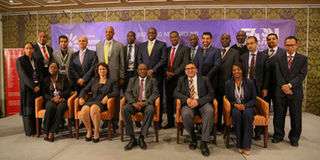Islamic finance roots grow deeper in Kenya

Participants at a past Islamic finance forum. PHOTO | FILE | NATION MEDIA GROUP.
What you need to know:
- Capital Markets Authority (CMA) was admitted by the Council of the Islamic Financial Services Board (IFSB) as an associate member of the board.
- The IFSB, is based in Kuala Lumpur, Malaysia, it’s a global standard setting body, which promotes the development of a prudent and transparent Islamic financial services industry.
- To date, IFBS has issued 26 standards, guiding principles and technical note for the Islamic financial services industry.
The Insurance (Amendment) Act 2016 signed into law by President Uhuru Kenyatta last week, is set to enhance Kenya’s position as the premier Islamic financial hub on the African continent.
The move came a week after the Capital Markets Authority (CMA) was admitted by the Council of the Islamic Financial Services Board (IFSB) as an associate member of the board.
“The new law provides for the licensing and regulation of Takaful insurance business in Kenya in order to encourage international investment in this sector, which is a target area for the Nairobi International Financial Centre,” the Insurance (Amendment) Act 2016 reads.
Takaful is a co-operative system of reimbursement or repayment in case of loss, organised as an Islamic or Sharia-compliant alternative to conventional insurance products.
Standard setting
The IFSB, is based in Kuala Lumpur, Malaysia, it’s a global standard setting body, which promotes the development of a prudent and transparent Islamic financial services industry.
It does this through introducing new, or adapting existing, international standards consistent with Sharia principles and recommends them for adoption.
To date, IFBS has issued 26 standards, guiding principles and technical note for the Islamic financial services industry.
The decision to admit CMA was made at the 29th IFSB Council meeting held in Cairo, Egypt on December 14.
In October, the government launched the Islamic Finance Project Management Office (PMO).
The PMO is being overseen by the National Treasury with the technical and financial assistance of Financial Sector Deepening Africa (FSDA), and under the mandate delegated to it by Kenya’s Financial Sector Regulators Forum (FSRF).
The PMO is led by Islamic Finance Advisory and Assurance Services (IFAAS), an international consultancy firm specialised in Islamic finance, in collaboration with Simmons & Simmons, an international law firm.
CMA’s Chief Executive Paul Muthaura said the authority membership in IFSB is a key step towards the development of Kenya as an Islamic finance hub in the East African region, which is a critical component in the establishment of Nairobi as an international financial centre.
“Vision 2030 identifies financial services as a priority sector expected to play a central role and a key facilitator in the achievement of the vision,” said Mr Muthaura.
He added: “The economic pillar has, as one of its main strategies, the broadening of the product offering in the financial markets to both domestic and foreign investors. To help diversify the product portfolio, Kenya has for some time now been laying the foundation for making the country a financial services hub, with one of the focus areas being its emergence as an Islamic financial hub.”
The IFSB’s Islamic Financial Services Industry Stability Report 2016 indicated that, the global Islamic financial services industry reached an overall total value of $1.88 trillion in 2015.
There are expectations of the market size growing to $3.4 trillion by end of 2018, an 81 per cent growth.
In the first half of 2015, the global Sukuk (Islamic bonds) amount outstanding stood at $291 billion, while Islamic fund’s assets figure was $71.3 billion.
During the 11 months to November 2015, the Takaful (insurance) sector was established to be $23.2 billion, while the Islamic banking sector’s assets stood at $1.5 trillion.
Witnessed growth
According to the CMA, Kenya’s Islamic finance market has also witnessed substantial growth over the last few years with several financial sector institutions of Islamic orientation operating presently.
This include two fully fledged Islamic banks and five Islamic windows, two credit union/saccos, one Takaful company, one Retaful window and one Capital Market Unit Trust Fund, as of September 2016.
Mr Muthaura observed that based on the global trends, the Islamic finance industry in the country remains largely untapped considering the significant real economy funding needs, particularly in the infrastructure realm, that are well aligned to Islamic or alternative financing structures.
“As an aspiring Islamic finance hub, with the right facilitative environment, we have a real opportunity to attract investment and capital inflows both from Muslim and non-Muslims locally and internationally,” said Mr Muthaura.
He added: “Kenya is in a unique position and only needs to implement policies that will further facilitate Islamic finance for it to reap the benefits of such efforts.”
The Insurance (Amendment) Act 2016, also enables the operationalisation of risk-based solvency requirements for insurers that were introduced in the Finance Act 2013.
Among those proposals is a requirement that an insurer should maintain a 100 per cent capital adequacy ratio at all times.




